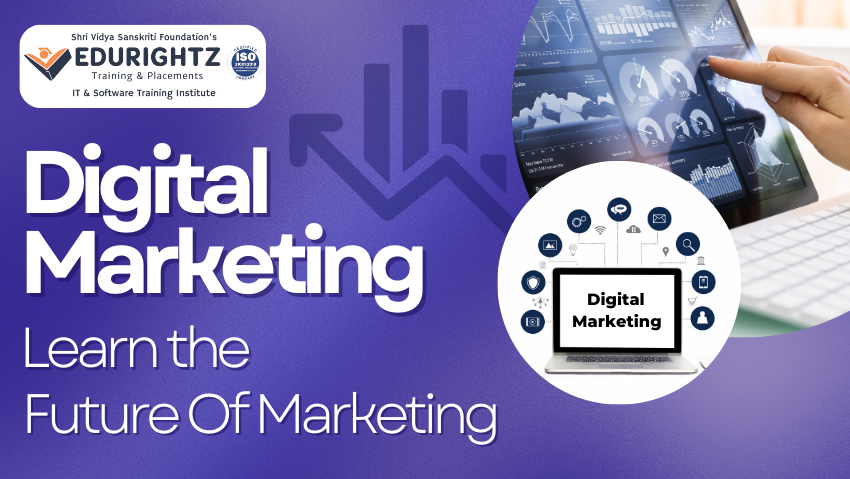
In today’s digital age, where the world is at our fingertips, traditional marketing methods are gradually being overshadowed by the power and potential of digital marketing. From small businesses to multinational corporations, everyone is recognizing the significance of establishing a robust online presence to thrive in the competitive market landscape. But what exactly is digital marketing, and why is it considered the future of marketing? Let’s delve into the world of digital marketing and explore its transformative impact on businesses worldwide.
Understanding Digital Marketing
Digital marketing encompasses a wide array of strategies and techniques aimed at promoting products or services through digital channels such as the internet, social media, search engines, email, and mobile applications. Unlike traditional marketing, which relies heavily on physical mediums like print ads or billboards, digital marketing leverages the power of technology to reach target audiences more effectively and efficiently.
Why Digital Marketing Matters
1. Global Reach
One of the most significant advantages of digital marketing is its ability to transcend geographical boundaries. With a well-crafted digital marketing strategy, businesses can reach potential customers worldwide, expanding their market reach exponentially.
2. Targeted Advertising
Digital marketing allows businesses to target specific demographics, interests, and behaviors, ensuring that marketing efforts are directed towards those most likely to convert into customers. This targeted approach not only increases the effectiveness of marketing campaigns but also maximizes return on investment (ROI).
3. Measurable Results
Unlike traditional marketing methods, which often lack clear metrics for success, digital marketing provides comprehensive analytics and tracking tools that enable businesses to measure the performance of their campaigns in real-time. This data-driven approach allows for continuous optimization and refinement, ensuring that marketing efforts yield tangible results.
4. Cost-Effectiveness
Digital marketing offers a cost-effective alternative to traditional advertising channels such as television or print media. With digital platforms, businesses can reach a larger audience at a fraction of the cost, making it accessible even to small businesses with limited marketing budgets.
5. Engagement and Interactivity
Digital marketing fosters greater engagement and interactivity with consumers through various channels such as social media, email, and interactive content. This two-way communication enables businesses to build meaningful relationships with their audience, leading to increased brand loyalty and customer satisfaction.
6. The Future of Marketing
As technology continues to evolve and consumer behavior shifts towards digital platforms, the future of marketing undoubtedly lies in the realm of digital. Here are some key trends shaping the future of digital marketing
7. Artificial Intelligence (AI) and Machine Learning
AI-powered tools and algorithms are revolutionizing digital marketing by enabling personalized recommendations, predictive analytics, and automated customer interactions. From chatbots to recommendation engines, AI is transforming the way businesses engage with their audience.
8. Voice Search Optimization
With the rising popularity of voice-activated devices such as smart speakers and virtual assistants, optimizing content for voice search is becoming increasingly important. Businesses need to adapt their digital marketing strategies to cater to this emerging trend and ensure that their content is optimized for voice search queries.
9. Video Marketing
Video content continues to dominate the digital landscape, with platforms like YouTube and TikTok experiencing exponential growth in recent years. Incorporating video into digital marketing strategies can help businesses capture audience attention and convey their brand message more effectively.
10. Augmented Reality (AR) and Virtual Reality (VR)
AR and VR technologies are opening up new possibilities for immersive marketing experiences. From virtual product demonstrations to interactive brand activations, AR and VR have the potential to revolutionize the way businesses engage with consumers.
Conclusion
In conclusion, digital marketing is not just a passing trend but rather the future of marketing. Its ability to reach global audiences, target specific demographics, and deliver measurable results makes it indispensable for businesses looking to stay ahead in today’s competitive landscape. By embracing digital marketing strategies and staying abreast of emerging trends and technologies, businesses can position themselves for success in the digital age. So, whether you’re a budding entrepreneur or a seasoned marketer, now is the time to harness the power of digital marketing and unlock new opportunities for growth and innovation.

